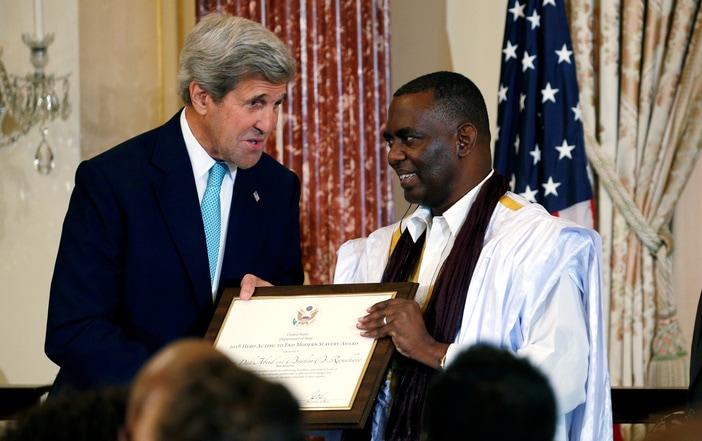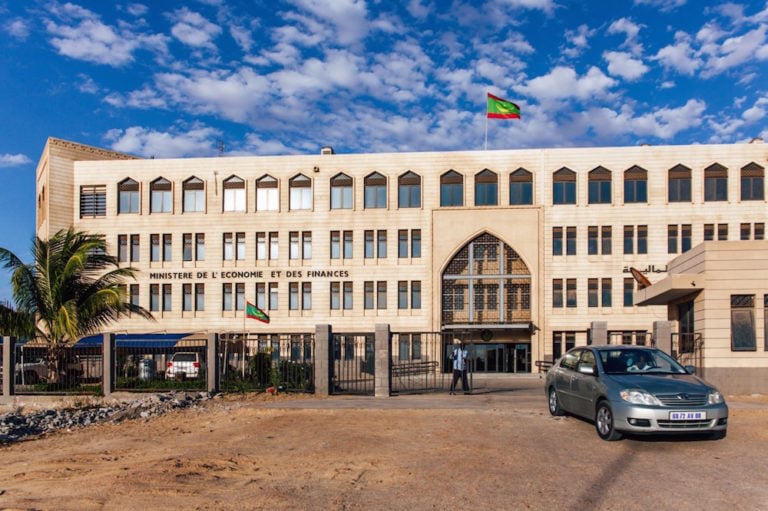In Mauritania, slavery is not something you read about in books. It is a living institution. An institution Biram Dah Abeid is paying a dear price to abolish.
In a conversation with Freedom House in December 2013, Biram Dah Abeid reflects on what it was like to grow up as a descendent of slaves, in a community where slavery was still very much alive.
…when I was growing up, I saw the isolation that slavery created around me. I realized that we are in a world which morally obligates us to help the population of slaves, who are primarily Mauritanian and are shut out from the rest of the world. It is our duty to restore their dignity and humanity.
If you were to conjure up an image of a typical human rights activist, chances are, you would not describe an individual who has burned books.
But setting books aflame is one of the more shocking ways Biram Dah Abeid – founder and president of the Initiative for the Resurgence of the Abolitionist Movement (IRA) – has sparked conversations about modern day slavery in his home country of Mauritania.
In an article for The New Yorker, Alexis Okeowo describes a moment in 2010 when – in the midst of leading a public prayer – Dah Abeid summons his bodyguard to cover texts that interpret Islamic law in lighter fluid.
Dah Abeid was raised in a Muslim household, just like most people in Mauritania. However, he believes many of his compatriots misinterpret Islam to justify slavery.
Dah Abeid and his colleagues have also advocated for the release of slaves and prosecution of slave owners by staging sit-ins at the justice ministry, visiting rural villages to raise awareness about slavery, and sharing information about the plight of Haratin peoples with the international community.
Dah Abeid knows all about being on the lower rungs of society. The activist was born a Haratin (also spelled Haratine) – a people in Mauritania who typically have darker skin and who the Encyclopaedia Britannica describes as “a socially and ethnically distinct class of workers.” Haratin are also, ironically, often referred to as “freed slaves.” Dah Abeid’s paternal grandmother was a slave, and his parents raised him in a village where they and other Haratin families farmed land owned by Beydanes – a privileged minority in Mauritania, who typically have lighter skin.
In a 2013 conversation with Freedom House, Dah Abeid reflects on what it was like to be raised among enslaved peoples. “When I was growing up, I saw the isolation that slavery created around me. I realized that we are in a world which morally obligates us to help the population of slaves… It is our duty to restore their dignity and humanity.”
Slavery was officially abolished in Mauritania in 1981. But it was not until 2007 that it became a criminal act to own another human being. Despite these laws, slavery and indentured labour still persist in the West African nation.
Statistics of how many people are enslaved in Mauritania are not consistent. In a conversation with Freedom House in 2013, Dah Abeid estimated that approximately 20% of the domestic population are enslaved, with 80% of them being women and children. In December 2015, the Media Foundation for West Africa cited the Global Slavery Index’s measure of 4% of the population being enslaved. The fluctuation in numbers is not surprising given that, according to a 2014 report by the United Nations Special Rapporteur on contemporary forms of slavery, “the government lacks definitive data on the nature and incidence of slavery in Mauritania.”
As the first person in his family to go to school, Dah Abeid became acutely aware of the deep injustices that Haratin people face. He went on to study law and history, work as an administrator in the courts system, and – in 2008 – founded the Initiative for the Resurgence of the Abolitionist Movement, a non-for-profit that he describes as “an organization of popular struggle.”
On 11 November 2014, Dah Abeid was arrested along with at least eight other anti-slavery campaigners. He and his colleagues had been visiting different villages, giving conferences on ‘property slavery,’ – “a system that transforms members of the Haratines community into labourers on their own ancestral lands,” according to Front Line Defenders.
Dah Abeid was charged and subsequently sentenced to two years in prison for “illegal assembly and rebellion”, “encouraging rebellion” and “refusal to carry out orders given by the administrative authorities”.
During his time in detention, Dah Abeid and fellow activists staged a three-day hunger strike calling for the right to be visited by relatives and for the date of the trial to be set for their colleagues detained in another prison, among other provisions.
Dah Abeid and his colleague Brahim Bilal Ramdhane, vice president of the IRA, were finally freed in May 2016, after the Supreme Court of Mauritania ruled for their immediate release.
Unfortunately, their release promoted more of a crackdown from the government on anti-slavery activists. In an interview with Freedom House in July 2016, Dah Abeid notes that the notoriety of their case is threatening to the Mauritanian government: “In prison, we gained a lot of support from the population and the international community. The government, which doesn’t have much interest in democracy, is frightened by popular figures.”
Dah Abeid is the recipient of many prestigious international awards, including the United Nations Human Rights Prize, the Front Line Defenders Award, the James Lawson Award, and, most recently the US State Department TIP [Trafficking in Persons] Hero Award.



